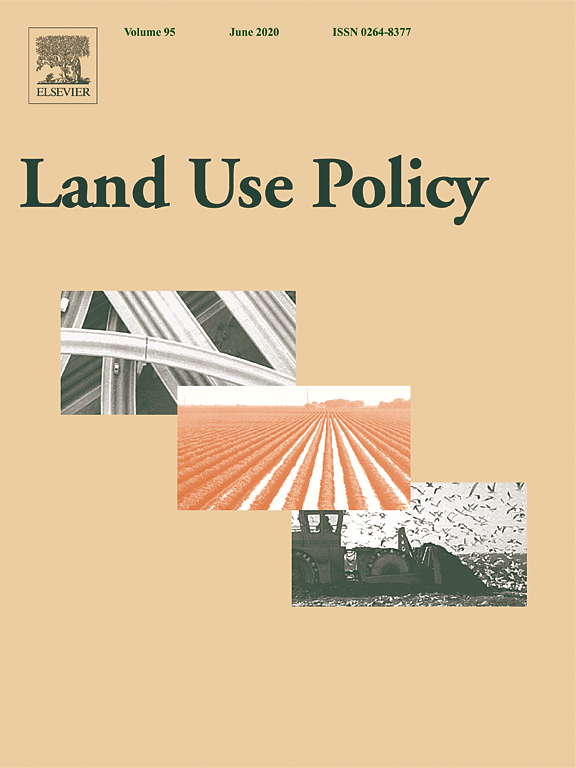Location
Land Use Policy is an international and interdisciplinary journal concerned with the social, economic, political, legal, physical and planning aspects of urban and rural land use. It provides a forum for the exchange of ideas and information from the diverse range of disciplines and interest groups which must be combined to formulate effective land use policies. The journal examines issues in geography, agriculture, forestry, irrigation, environmental conservation, housing, urban development and transport in both developed and developing countries through major refereed articles and shorter viewpoint pieces.
Land Use Policy aims to provide policy guidance to governments and planners and it is also a valuable teaching resource.
ISSN: 0264-8377
Members:
Resources
Displaying 51 - 55 of 279Total income and ecosystem service sustainability index: Accounting applications to holm oak dehesa case study in Andalusia-Spain
This research develops the novel concept of an economic ecosystem service sustainability index from the perspective of total income theory, and presents its empirical application at the spatial unit scale of the agroforestry farm. This paper compares the results accrued from applying the refined standard System of National Accounts (rSNA) and the authors’ Agroforestry Accounting System (AAS).
Protecting our prairies: Research and policy actions for conserving America’s grasslands
Grasslands are among the most endangered ecosystems in the world. They supply vital resources for society, support an abundance of wildlife species, and store rich carbon reserves beneath their surfaces. Despite this, only a fraction of original grasslands in the United States now remains, and their rate of conversion to cropland has recently reaccelerated. This paper discusses opportunities that are immediately available to reduce the loss of U.S. native grasslands (i.e., prairie) and advance toward collective goals in grassland conservation.
Not seeing the carbon for the trees? Why area-based targets for establishing new woodlands can limit or underplay their climate change mitigation benefits
Area-based targets for afforestation are a frequent and prominent component of policy discourses on forestry, land use and climate change emissions abatement. Such targets imply an expected contribution of afforestation to the net reduction of greenhouse gas emissions, yet the nature of afforestation undertaken and its geographical distribution means that there is considerable uncertainty over the eventual emission reductions outcomes.
Five scale challenges in Ecuadorian forest and landscape restoration governance
The forest and landscape restoration (FLR) targets set as part of the Bonn Challenge draw attention to the governance arrangements required to translate national FLR targets into local action. To achieve the targets, actors at multiple levels of the governance scale aim to influence relevant processes on the ecological scale. In this article, we focus on the scale challenges relating to the implementation of Ecuador’s restoration targets, by analysing the implementation of the 2014–2017 National Forest Restoration Plan in the montane Chocó Andino and Bosque Seco landscapes.
Evaluating the lifestyle impact of China’s rural housing land consolidation with locational big data: A study of Chengdu
Housing land consolidation and relocation has been widely implemented in rural China as a policy tool to reduce the area of built-up land, reclaim agricultural land, and redistribute the use of land. Despite of the large scale of implementation, the impact of this policy on the daily life of rural people is not sufficiently evaluated. Our work aims to fill in this gap by examining the daily activity pattern of rural residents in consolidated and unconsolidated villages through mobile phone locational data, using the Chengdu city-region as the case.



